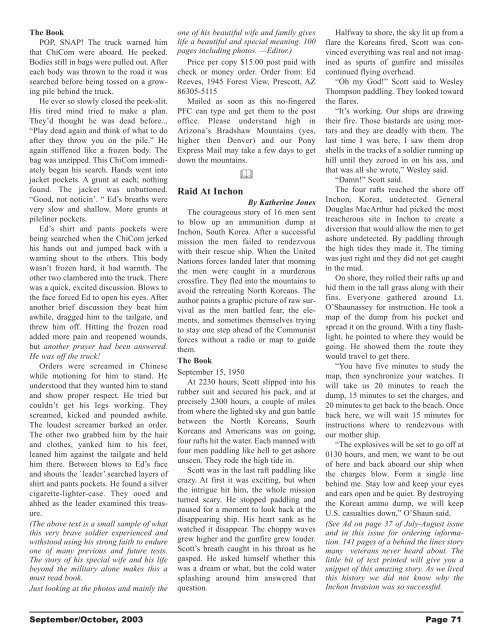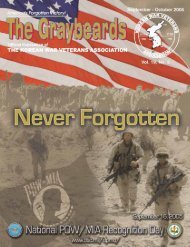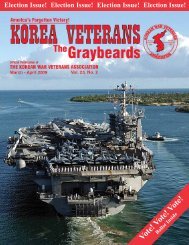GENERAL RAYMOND G. DAVIS - Korean War Veterans Association
GENERAL RAYMOND G. DAVIS - Korean War Veterans Association
GENERAL RAYMOND G. DAVIS - Korean War Veterans Association
Create successful ePaper yourself
Turn your PDF publications into a flip-book with our unique Google optimized e-Paper software.
The Book<br />
POP, SNAP! The truck warned him<br />
that ChiCom were aboard. He peeked.<br />
Bodies still in bags were pulled out. After<br />
each body was thrown to the road it was<br />
searched before being tossed on a growing<br />
pile behind the truck.<br />
He ever so slowly closed the peek-slit.<br />
His tired mind tried to make a plan.<br />
They’d thought he was dead before...<br />
“Play dead again and think of what to do<br />
after they throw you on the pile.” He<br />
again stiffened like a frozen body. The<br />
bag was unzipped. This ChiCom immediately<br />
began his search. Hands went into<br />
jacket pockets. A grunt at each; nothing<br />
found. The jacket was unbuttoned.<br />
“Good, not noticin’. “ Ed’s breaths were<br />
very slow and shallow. More grunts at<br />
pileliner pockets.<br />
Ed’s shirt and pants pockets were<br />
being searched when the ChiCom jerked<br />
his hands out and jumped back with a<br />
warning shout to the others. This body<br />
wasn’t frozen hard, it had warmth. The<br />
other two clambered into the truck. There<br />
was a quick, excited discussion. Blows to<br />
the face forced Ed to open his eyes. After<br />
another brief discussion they beat him<br />
awhile, dragged him to the tailgate, and<br />
threw him off. Hitting the frozen road<br />
added more pain and reopened wounds,<br />
but another prayer had been answered.<br />
He was off the truck!<br />
Orders were screamed in Chinese<br />
while motioning for him to stand. He<br />
understood that they wanted him to stand<br />
and show proper respect. He tried but<br />
couldn’t get his legs working. They<br />
screamed, kicked and pounded awhile.<br />
The loudest screamer barked an order.<br />
The other two grabbed him by the hair<br />
and clothes, yanked him to his feet,<br />
leaned him against the tailgate and held<br />
him there. Between blows to Ed’s face<br />
and shouts the `leader’ searched layers of<br />
shirt and pants pockets. He found a silver<br />
cigarette-lighter-case. They ooed and<br />
ahhed as the leader examined this treasure.<br />
(The above text is a small sample of what<br />
this very brave soldier experienced and<br />
withstood using his strong faith to endure<br />
one of many previous and future tests.<br />
The story of his special wife and his life<br />
beyond the military alone makes this a<br />
must read book.<br />
Just looking at the photos and mainly the<br />
one of his beautiful wife and family gives<br />
life a beautiful and special meaning. 100<br />
pages including photos. —Editor.)<br />
Price per copy $15.00 post paid with<br />
check or money order. Order from: Ed<br />
Reeves, 1945 Forest View, Prescott, AZ<br />
86305-5115<br />
Mailed as soon as this no-fingered<br />
PFC can type and get them to the post<br />
office. Please understand high in<br />
Arizona’s Bradshaw Mountains (yes,<br />
higher then Denver) and our Pony<br />
Express Mail may take a few days to get<br />
down the mountains.<br />
<br />
Raid At Inchon<br />
By Katherine Jones<br />
The courageous story of 16 men sent<br />
to blow up an ammunition dump at<br />
Inchon, South Korea. After a successful<br />
mission the men failed to rendezvous<br />
with their rescue ship. When the United<br />
Nations forces landed later that morning<br />
the men were caught in a murderous<br />
crossfire. They fled into the mountains to<br />
avoid the retreating North <strong>Korean</strong>s. The<br />
author paints a graphic picture of raw survival<br />
as the men battled fear, the elements,<br />
and sometimes themselves trying<br />
to stay one step ahead of the Communist<br />
forces without a radio or map to guide<br />
them.<br />
The Book<br />
September 15, 1950<br />
At 2230 hours, Scott slipped into his<br />
rubber suit and secured his pack, and at<br />
precisely 2300 hours, a couple of miles<br />
from where the lighted sky and gun battle<br />
between the North <strong>Korean</strong>s, South<br />
<strong>Korean</strong>s and Americans was on going,<br />
four rafts hit the water. Each manned with<br />
four men paddling like hell to get ashore<br />
unseen. They rode the high tide in.<br />
Scott was in the last raft paddling like<br />
crazy. At first it was exciting, but when<br />
the intrigue hit him, the whole mission<br />
turned scary. He stopped paddling and<br />
paused for a moment to look back at the<br />
disappearing ship. His heart sank as he<br />
watched it disappear. The choppy waves<br />
grew higher and the gunfire grew louder.<br />
Scott’s breath caught in his throat as he<br />
gasped. He asked himself whether this<br />
was a dream or what, but the cold water<br />
splashing around him answered that<br />
question.<br />
Halfway to shore, the sky lit up from a<br />
flare the <strong>Korean</strong>s fired, Scott was convinced<br />
everything was real and not imagined<br />
as spurts of gunfire and missiles<br />
continued flying overhead.<br />
“Oh my God!” Scott said to Wesley<br />
Thompson paddling. They looked toward<br />
the flares.<br />
“It’s working. Our ships are drawing<br />
their fire. Those bastards are using mortars<br />
and they are deadly with them. The<br />
last time I was here, I saw them drop<br />
shells in the tracks of a soldier running up<br />
hill until they zeroed in on his ass, and<br />
that was all she wrote,” Wesley said.<br />
“Damn!” Scott said.<br />
The four rafts reached the shore off<br />
Inchon, Korea, undetected. General<br />
Douglas MacArthur had picked the most<br />
treacherous site in Inchon to create a<br />
diversion that would allow the men to get<br />
ashore undetected. By paddling through<br />
the high tides they made it. The timing<br />
was just right and they did not get caught<br />
in the mud.<br />
On shore, they rolled their rafts up and<br />
hid them in the tall grass along with their<br />
fins. Everyone gathered around Lt.<br />
O’Shaunassey for instruction. He took a<br />
map of the dump from his pocket and<br />
spread it on the ground. With a tiny flashlight,<br />
he pointed to where they would be<br />
going. He showed them the route they<br />
would travel to get there.<br />
“You have five minutes to study the<br />
map, then synchronize your watches. It<br />
will take us 20 minutes to reach the<br />
dump, 15 minutes to set the charges, and<br />
20 minutes to get back to the beach. Once<br />
back here, we will wait 15 minutes for<br />
instructions where to rendezvous with<br />
our mother ship.<br />
“The explosives will be set to go off at<br />
0130 hours, and men, we want to be out<br />
of here and back aboard our ship when<br />
the charges blow. Form a single line<br />
behind me. Stay low and keep your eyes<br />
and ears open and be quiet. By destroying<br />
the <strong>Korean</strong> ammo dump, we will keep<br />
U.S. casualties down,” O’Shaun said.<br />
(See Ad on page 37 of July-August issue<br />
and in this issue for ordering information.<br />
141 pages of a behind the lines story<br />
many veterans never heard about. The<br />
little bit of text printed will give you a<br />
snippet of this amazing story. As we lived<br />
this history we did not know why the<br />
Inchon Invasion was so successful.<br />
September/October, 2003 Page 71

















